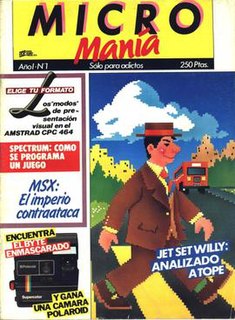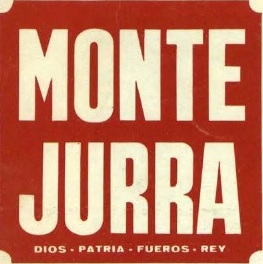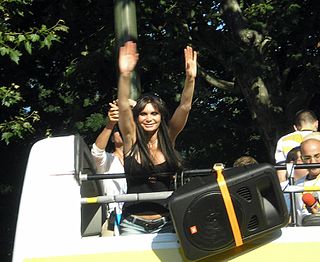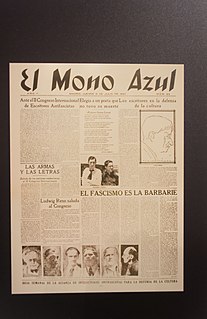
Marca, stylised as MARCA, is Spain's national daily sport newspaper owned by Unidad Editorial. The newspaper focuses primarily on football, in particular the day-to-day activities of Real Madrid, FC Barcelona, and Atlético Madrid. It has a daily readership of over 2,500,000, the highest in Spain for a daily newspaper, and more than half of sports readership, as of 2007.
El Jueves is a Spanish weekly satirical magazine based in Barcelona.
Spanish comics are the comics of Spain. Comics in Spain are usually called historietas or cómics, with tebeos primarily denoting the magazines containing the medium. Tebeo is a phonetic adaptation of TBO, a long-running (1917–1983) Spanish comic book magazine, and sounds like "te veo".
Fondo de Cultura Económica is a Spanish language, non-profit publishing group, partly funded by the Mexican government. It is based in Mexico but it has subsidiaries throughout the Spanish-speaking world.

Dafne Fernández Fernández is a Spanish actress and dancer.

El Gráfico is an Argentine online sports magazine, originally published by Editorial Atlántida as a print publication between 1919 and 2018. El Gráfico was released in May 1919 as a weekly newspaper, and then turned to a sports magazine exclusively. It began to be scheduled monthly from 2002, and was discontinued in 2018, continuing only online.
Ediciones El Puente was a literary project for young writers in Cuba just after the 1959 revolution. Between 1961 and 1965 they published each other's work, introduced dozens of new voices - among them poet and translator Nancy Morejón, playwright Gerardo Fulleda León, playwright-activist Ana Maria Simo and folklorist Miguel Barnet - and held readings and performances.

Israel and Spain have maintained diplomatic ties since 1986. Israel has an embassy in Madrid. Spain has an embassy in Tel Aviv, an honorary consulate in Haifa and a General Consulate in Jerusalem, which is regarded as diplomatic missions to the city of Jerusalem, Gaza and the territories of the West Bank. In additions to both countries being member states of the United Nations, both countries are members of the Union for the Mediterranean. The two countries are also involved with various programmes and agreements through the European Union, of which Spain is a member, and its relations with Israel.

Micromanía is a Spanish computer game magazine. It was founded by the publisher HobbyPress, currently a subsidiary of Axel Springer SE. It was created in May 1985 and is one of the first magazines in Europe exclusively devoted to video games. It was first published soon after MicroHobby, which had been created just a few months earlier by the same publisher. The magazine in its two first periods was a major outlet supporting of the golden era of Spanish software. Micromanía celebrated its 25th anniversary in 2010. In July 2012, Axel Springer sold Micromanía to other owner, focussing its video game coverage in its other magazine, Hobby Consolas. Micromanía team continues the printed magazine independently, published by BlueOcean Publishing.

José Miguel Vilar-Bou is a contemporary Spanish novelist, short story writer, and journalist, specializing in horror fiction, science-fiction and fantasy. His work has been awarded with several prizes in literary competitions. His novel Alarido de Dios [The Cry of God] was a finalist for the Awards Celsius 2010 and his short story "El laberinto de la araña" ["The Spider's Labyrinth"] received in the same year the Nocte Award for the best Spanish horror story. In the Spanish Historia natural de los cuentos de miedo [Natural History of the Weird Tales], because of the "expeditious and accurate in its proposal", critic José L. Fernández Arellano mentioned this author's story "La luz encendida" as leading among the young writers' of the genre of horror in Spain.
Cinemanía is a Spanish language monthly film magazine based in Madrid, Spain. It has been in circulation since 1995.

LGBT in Argentina refers to the diversity of practices, militancies and cultural assessments on sexual diversity that were historically deployed in the territory that is currently the Argentine Republic. It is particularly difficult to find information on the incidence of homosexuality in societies from Hispanic America as a result of the anti-homosexual taboo derived from Christian morality, so most of the historical sources of its existence are found in acts of repression and punishment. One of the main conflicts encountered by LGBT history researchers is the use of modern concepts that were non-existent to people from the past, such as "homosexual", "transgender" and "travesti", falling into an anachronism. Non-heterosexuality was historically characterized as a public enemy: when power was exercised by the Catholic Church, it was regarded as a sin; during the late 19th and early 20th centuries, when it was in the hands of positivist thought, it was viewed as a disease; and later, with the advent of civil society, it became a crime.

Montejurra was a Spanish monthly magazine, published between 1960 and 1971. Based in Pamplona it was distributed mostly in Navarre and Northern Spain, though pre-paid copies sent by mail reached recipients in the entire country. Its circulation is not clear; at one point the editors hoped to have 20,000 subscribers. The monthly was formatted as a political magazine and evolved from a 4-page text-only bulletin to a 44-page partially color illustrated review; altogether there were 106 issues published. Politically Montejurra was clearly identified as a Carlist periodical. Its launch was related to Carlism adopting a conciliatory position towards Francoism; following first ambiguous and then increasingly critical stand, since the mid-1960s the monthly suffered from censorship interventions, eventually to be forcibly closed by administration. Montejurra's editorial board was dominated by members of the Progressist faction and the monthly proved vital in their bid for control of the movement; its dominant thread was promotion of the Borbón-Parma dynasty, and especially prince Carlos Hugo.

CTXT is a left wing independent Spanish online publication founded in January 2015 that offers long-form news analysis and opinion. Its office is in Madrid, Spain. CTXT is an abbreviation of the name Revista Contexto.
Almudena Gracia Manzano, known artistically as Malena Gracia, is a Spanish actress, singer, dancer, vedette, and pin-up model. She is best known for having obtained a triple platinum certification for her song "Loca", with more than 300,000 copies sold. She has also appeared on television series with high ratings.

Yolanda del Prado Pascual Berrocal, better known as Yola Berrocal, is a Spanish media personality who has worked as a dancer, singer and actress.
Mondo Sonoro, sometimes shortened to la Mondo, is a Spanish magazine established in 1994 which focuses on current alternative, popular and indie music, as well as national emerging bands. Co-founded by Sergio Marqués and Jose Macarro in Barcelona, Dani López joined them in 1995 and they are still in charge of the magazine. By 2019, Mondo Sonoro had a circulation of 125.000 monthly copies and over two million visits to its website every year.

Editorial Molino was a publishing house created in Barcelona in 1933 at the initiative of Pablo del Molino Mateus (1900-1968), with the vision of creating a collection of novels accessible to the general public.

El Mono Azul was a Spanish language anti-fascist magazine which was published in Madrid during the Spanish Civil War. The magazine existed between 1936 and 1939 and was one of the major cultural, intellectual and artistic publications during the war with the subtitle hoja semanal de la Alianza de Intelectuales Antifascista para la Defensa de la Cultura.

Ramón Mauricio González Gutiérrez, known by his pen name José Baroja, is a Chilean writer, academic and editor. He is a member of the Poets of the World Movement and representative of the new Chilean narrative.












